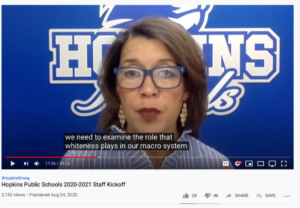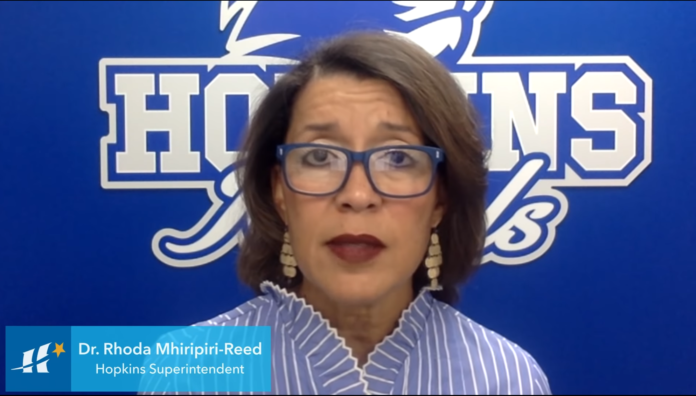Hopkins Public Schools Superintendent Rhoda Mhiripiri-Reed recently welcomed teachers and staff back to school by urging them to examine their “whiteness.”
During an Aug. 24 virtual staff kickoff event, Mhiripiri-Reed delivered a 25-minute lecture on the “dual pandemic” of COVID-19 and racism in Hopkins Public Schools, which voted Tuesday to not renew its contract with the Minnetonka Police Department.
“In our communications to staff and families, we have referenced a dual pandemic. Mr. George Floyd – rest in power – is seemingly the contemporary face of the pandemic of racial injustice. This pandemic of systemic racism has soiled this country, not just since slavery, but since the genocide of the Native Americans and the American Indians who resided on and cared for this land,” she said.
At Hopkins Public Schools, “we talk extensively about our diversity and we celebrate it with great pride,” said Mhiripiri-Reed, but a YouTube video of the kickoff event was removed from public view Thursday afternoon when it began receiving some negative attention.

“Hopkins Public Schools can no longer be a place where scholars experience racism. Racism does not only not belong in our schools, it does not belong anywhere, and in order to eradicate racism, we need to examine the role that whiteness plays in our macro-system of white supremacy,” she continued. “As we intentionally work to turn crisis into opportunity, Hopkins Public Schools will work intentionally to become an anti-racist system.”
Mhiripiri-Reed thanked the members of the “Anti-Racism Task Force,” a group of 30 teachers and students who “studied the 13 characteristics of white supremacy and used the research to form an anti-racist learning framework.”
“Researchers who have studied what it means to be anti-racist explain that it is not the responsibility of people of color to fix racism, or to explain to white people how not to be racist. Rather, anti-racism requires an understanding of history and an understanding of how people of color have been historically and systematically impacted by racist institutional policies and human practices,” she said.
She explained that becoming an “anti-racist system” requires “white people and all people to self-educate, to listen to people of color, and to identify and interrupt racist policies, practices, and behaviors.”
“Becoming anti-racist is a journey that begins with self-reflection. Without blame or shame, we must recognize that we were conditioned to operate within a system of racism that pervades throughout every aspect of our daily existence. Yet each of us still has the responsibility to engage in self-education and self-analysis,” Mhiripiri-Reed added.
She then encouraged educators to consider instances in which they have “reinforced a racist policy” and what they can do to “more deeply examine” their “racist beliefs.” In her own “self-analysis,” Mhiripiri-Reed said she “recognized the privilege of being light-skinned, well-educated, and being in a role that is given formal authority.”
“If you are white and/or if you are privileged in another way, I ask you to engage in the same self-analysis to see your own privilege and to examine your whiteness,” she continued.
According to Mhiripiri-Reed, the whole district “will benefit from Hopkins becoming anti-racist.”
“For scholars and staff in the LGBTQIA+ community, for scholars and staff who are religiously, linguistically, and/or neurologically diverse, becoming a teal organization where all voices are heard and included, and becoming an anti-racist system where black and brown folks are uplifted, we will all benefit. Let’s do what we ask of our scholars and demonstrate empathy toward one another as we begin this important journey together,” she explained.
She concluded her remarks by declaring that the “dual pandemics” present an opportunity for “seeking wellness.”
“The Wellness Task Force, through their extensive research, suggests a trauma-informed and anti-racist approach to adult and scholar wellness across all Hopkins schools,” she said.
The kickoff event then featured a series of “student stories” on “being black at Hopkins,” which were submitted by past and present students of Hopkins Public Schools.
Dr. Raj Sethuraju, a faculty member at Metropolitan State University, was the keynote speaker for the virtual event and reiterated that America is facing a “pandemic of racism.”
Although Hopkins Public Schools has made the video private on YouTube, Alpha News obtained a copy, which can be viewed below.











